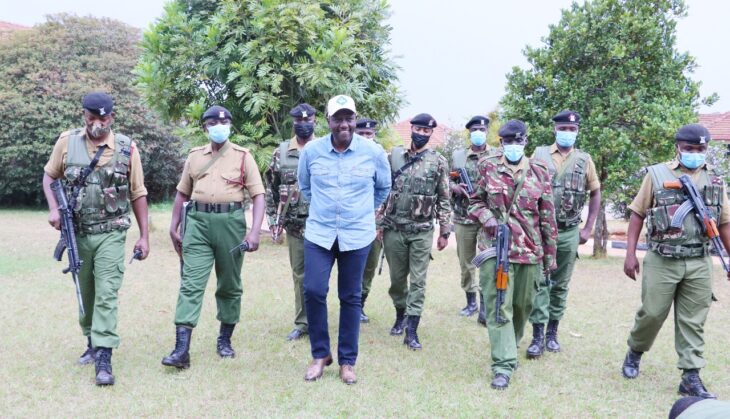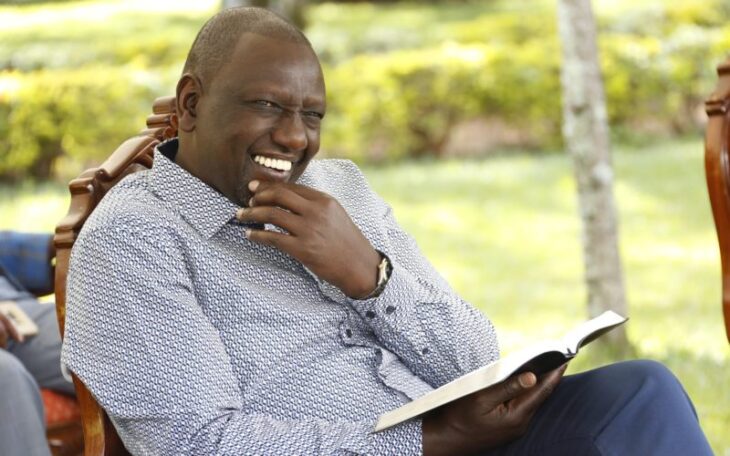NAIROBI, Kenya, Sept 1- The storm over the safety of Deputy President William Ruto continues to take many twists and turns following the sudden replacement of highly trained General Service Unit officers with the Security of Government officers from the Administration Police Service.
While the move has led to a build-up of anxiety among the supporters of the Deputy President, the government says there is no cause for alarm.
When Interior Cabinet Secretary Dr. Fred Matiang’i appeared before the Committee on Administration and National Security of the National Assembly on Wednesday, many had hoped the matter will be settled. CS Matiang’i was in the company of all senior security officers led by Inspector General Hillary Mutyambai.
But hours after the appearance, Office of the Deputy President spokesperson David Mugonyi accused Matiang’i of misleading the country on Ruto’s security detail.
During the explosive session in parliament, Matiang’i said the Deputy President has 257 officers assigned to him.
But it is a session that Mugonyi said in a statement that was meant to humiliate DP Ruto.
So, who is telling the truth and who is lying?
While the Deputy President in a Tweet dismissed the Wednesday sitting as a ‘waste of parliamentary time on a non-issue’, Mugonyi said the further revelations made by Matiang’i on Wednesday had exposed him to further security threats.
Matiang’i had earlier allayed fears that the Deputy President’s security had been breached.
“The problem with our country is that some people suffer from sympathy addiction. They’re always looking for opportunities to lament about this and that to attract sympathies. We in the security sector make decisions after serious considerations knowing we will be held accountable,” Matiang’i said.
Deputy president William Ruto. Photo/Courtesy
This did not augur well with Mugonyi, who in a statement said the Interior Cabinet Secretary had abused the power of his office.
“From the utterances attributed to Cabinet Secretary Fred Matiang’i, there is no evidence whatsoever that he understands or is interested in understanding the global constitutional or even local context of concerns about the security of the Deputy President,” he said in a statement to newsrooms.
Mugonyi further added, “Dr. Matiang’i has abused public resources and the power of his office to score cheap points in a futile attempt to humiliate, disparage, denigrate and ridicule the person and the Office of the Deputy President for political propaganda. He has conducted himself in a manner totally unbecoming of the holder of such high office and has attempted to profile the Deputy President as ineligible to receive services from the Ministry of Interior.”
Compared to other vice presidents in Kenya’s history Ruto is on record as the most guarded with a security personnel of 257 according to documents presented by Matiang’i from police records.
The country’s founding vice president Jaramogi Oginga Odinga had a security detail consisting of 30 officers,Joseph Murumbi,Josephat Karanja,Musalia Mudavadi,Michael Kijana Wamalwa and Moody Awori were protected by 22 security officers.
Daniel Moi had at least 34, Mwai Kibaki had 26, Prof. George Saitoti had 30,Kalonzo Musyoka had 26 while former Prime Minister Raila Odinga had a security personnel consisting of 57 officers.
-How it started –
A week ago the Inspector General of Police effected changes in the security detail of the Deputy President by replacing the General Service Unit officers with officers from the Administration Police Service.
“This is a normal re-assignment of duties within the National Police Service to enhance efficiency and effectiveness,” Mutyambai said, “the Presidential Escort Unit continues to provide close protection security to the Deputy President.”
But the big question is, why now? Has it happened before in the 9 years the Deputy President has been in office?
“The office of the Deputy President has formally written to the IG seeking an explanation on this matter and reasons for the breach of security,” Mugonyi said on August 27, while citing Police Service Standing Orders, Chapter 8 Section 5 (e), which states that the “GSU Commandant shall be responsible for the security of the President, Deputy President, State Houses, and lodges.”
All this sparked serious political reactions mostly from leaders allied to DP Ruto, who were concerned about his safety.
This prompted the Committee on Administration and National Security of the National Assembly to summon Matiang’i and all other top security officers, for an explanation.
-What Matiangi Said-
In a detailed submission, the Interior Cabinet Secretary revealed the number of security officers deployed to the Deputy President in his private and official residences, as well as property spread across the country.
He listed all his property and the number of police officers manning them.
“Apart from the 74 presidential escort security officers assigned to DP, he has many other security personnel provided to him in total numbering to 257. We have provided sufficient security to the holder of the office of the Deputy President,” the Interior Cabinet Secretary said.
At least 4,000 security officers are dedicated to the protection of those classified as Very Important Persons (VIPs) or VVIPS in the country.
Many according to police come from the Security of Government Building Unit (SGB) formation which looks after government buildings,installations or what police refer to as the Critical Infrastructure Protection Unit (CIPU).
“The protection of the president and deputy president is a separate matter. I want to be on record on this matter, the president and DP are protected by a special formation we call the Presidential Escort Unit (PEU) ..this unit is trained, prepared and their singular responsibility is to protect the president and the deputy president,” Said Matiang’i.
Matiang’i termed the Deputy president’s security set up as a multi-layered endevour. The first layer, also known as the inner layer, which is said to be the most critical is under the commander of a commissioner of police.
Others in the first layer include: one senior superintendent (SSP), 2 Chief Inspectors, 74 Presidential Escort Unit officers (PEU), 5 General Service Unit (GSU) officers who double up as drivers and Body guards and 6 Directorate of Criminal Investigations (DCI) officers.
The second layer, also known as the Outer security layer consists of 121 Administration Police officers (AP) consisting of officers from the Security of Government Building Unit (SGB) and the Critical Infrastructure Protection Unit (CIPU).
This layer also consists of a 24-hour patrol by a team led by the local sub county police commander.
The third and final security layer also known as the auxiliary security layer consists of 51 security officers spread across the deputy president’s various properties.
“I am not aware of anything in the past or present that has come close to threaten the office of the holder of the deputy president of Kenya. We have very highly trained personnel in the security sector, we take this as a very fundamental duty and responsibility because, it snot just a matter of national security but also a matter of national pride. If the security of the number two in command is an issue of concern then it means we are a bunch of jokers and there is nothing we are doing,”
Matiang’i however says the number of security officers guarding DP Ruto’s properties could be even high as he only made public 10 properties listed to his name. They include: Kitengela Gas, Weston Hotel along Lang’ata Road in Nairobi, Murumbi Farm – Transmara Narok (LR.Transmara/INTONA/34) which sits on 395 hectares.
ADC Laikipia Mutara Ranch (LR.No 10069/1) – which sits on 6,073 hectares, Dolphine Hotel (LR.N0.MN/1/3266) in Mombasa County which sits on 3 hectares, Mata Farm in Taita Taveta (LR.No10287/10&11) which sits on 2,537 hectares,a private residence in Elgon in Eldoret, Koitalele Poultry Farm in Eldoret, Private residence in Kosachei in Eldoret and Kwae Island Development Ltd.- Wilson Airport (2 hangers and 5 helicopters).
“Most of the debate about this and anyone you hear speaking about downgrading definitely displays a measure of very frustrating ignorance…for example the IG has over 13 other police units,that he could draw from in providing support to the deputy president’s security. People do not understand entirety the formation of the police service and don’t understand the strengthen and capacity we have and the training of all the other formations.” he said.

But according to Mugonyi, some of the property listed by CS Matiang’i does not belong to DP Ruto.
“To underscore Matiangi’s recklessness, many properties allocated to the Deputy President in his statement to Parliament are in fact not his,” Mugonyi said.
He however did not single out DP Ruto’s property, out of the list provided by Matiangi.
“To add insult to injury, Matiang’i asserts that he had deployed security officers to these unknown strange properties. In any event, the Deputy President went on record as early as 2018 to announce his readiness to undergo a lifestyle audit per the President’s directive. This false association with strange and fictitious properties is therefore unnecessary and malicious.”
He said the current security infrastructure assigned to the Office of the Deputy President was designed by the National Security Council.
“The Deputy President does not deploy security to himself or anyone else. When he assumed office in 2013, the National Security Council had already established a security model for the presidency and constitutional offices. Any change to the arrangement would have been discussed and formally approved at the appropriate level.”
Is the Deputy President safe? And if he has 257 officers, why the high number?
“There’s an overlap between business and public service. If you are the IG and you receive a request to deploy security to private business from a VVIP, it becomes very difficult to say No. We need statutory action to curb the possibility of misuse of security personnel provision,” Matiangi explained.
The Cabinet Secretary urged Parliament to come up with legislation that places a cap on the number of officers government officials should be allocated.
“We need to be guided so that we avoid scenarios where we are being requested to go and guard kiosks and butcheries,” he said.
A section of Kenyans on Twitter have raised concerns over the independence of the National Police Service, following Matiang’i’s sentiments.
Want to send us a story? Contact Shahidi News Tel: +254115512797 (Mobile & WhatsApp)



